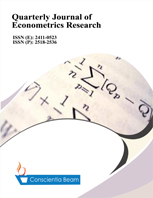Inflationary Rate in Nigeria: Impact of Foreign Capital Inflows
DOI:
https://doi.org/10.18488/journal.88.2021.71.44.54Abstract
As the prices of daily needs are aggravating in Nigeria, the value of the country’s currency (naira) is less appreciated on a daily basis, and this pose a threat to a good standard of living in Nigeria. Therefore, this study investigated the impact of foreign capital inflows on the persistent increase in inflation in Nigeria over the period of 1985 to 2019. The Autoregressive Distributed Lags was used to obtain the parameter estimates of the long run relationship between foreign capital inflows and inflation. By using the Forecast Error Variance Decomposition techniques, the cause-effect analysis of foreign capital inflows and inflation was determined. Results provide evidence of a long run relationship between the series. Results further indicate that inflation is sensitive to foreign capital inflows variables such as net official development assistance received and remittance inflows in Nigeria. Policies that reduce the negative impact on inflation are recommended in the body of the paper.

